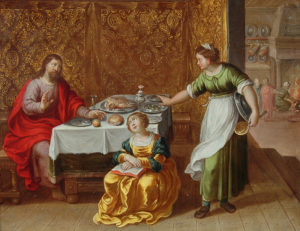Thoughts on Sunday’s Lessons for July 21, 2019
First Reading (Track One): Amos 8:1-12
What does hospitality look like? How should it be practiced? In the Gospel story of Mary and Martha, which sister gets hospitality right? Don’t be too quick to decide before you’ve looked through Sunday’s readings.

Christ in the House of Mary and Martha (1610-1622), oil painting on copper by Vincent Adriaenssen (1595-1675). Private collection. (Click image to enlarge.)
In our Track One first reading, the Prophet Amos continues his angry prophecy against Israel’s king and high priest. Warning of the terrible fate that awaits them and their families if they continue to treat their subjects unjustly – inhospitably – he recites a horrifying litany of curses that will come to the land whose rulers trample the needy and ruin the poor. Their sun will go dark and their crops will fail. The nation will hunger and thirst for God’s words as it will for food and water.
First Reading (Track Two): Genesis 18:1-10a
In Sunday’s Track Two first reading the story of the chosen people begins. God, speaking through three mysterious strangers, comes to the patriarch Abraham by the oaks of Mamre. He greets these strangers with open hospitality far beyond their simple needs, killing a calf to prepare them a lavish meal. Then they reveal that he and his wife Sarah, despite their advanced age, will have a son. Later we learn that Abraham and Sarah’s offspring, as numerous as the stars, will inherit the Promised Land. Now, take your bible and turn the page. As we’ll hear in next week’s reading, immediately following this example of gracious hospitality and its rewards, we’ll hear the story of Sodom’s failure of hospitality and the total destruction that it reaped.
Psalm: (Track One): Psalm 52
Harmonizing nicely with the Track One first reading, the Psalmist angrily calls out a tyrant (Doeg the Edomite, who conspired with Saul to kill King David, according to the small print at the top of the psalm). We hear accusation in every line: This was a tyrant who trusted in great wealth; a liar, who loved evil more than good. Oh, that God would demolish you utterly, the Psalmist shouts. Wicked people who steal from the poor will fail, while those who trust in God’s eternal mercy will live in joy.
Psalm (Track Two): Psalm 15
Who may come to the holy hill and reside in God’s tabernacle? Such a privilege must be earned, the Psalmist sings. It should come as no surprise that, when we pare this psalm down to its essentials, we get another lesson in hospitality and love of neighbor: Do what is right. Don’t slander. Don’t do wrong by our friends or harm the innocent. These are simple commands, and they guide us into a life of righteousness.
Second Reading: Colossians 1:15-28
The letters of Paul and many of the later letters written by others in Paul’s name use a common approach: They are written to guide specific Christian communities, to advise and to teach. They are like sermons in writing. You can hear it in this passage from the letter to the Colossians today. After a theological meditation on Christ as image of the invisible God who made peace through his sacrifice, the writer tells us that he first became a servant of the gospel, a servant of the church. As a servant, he sounds a lot like Martha in Sunday’s Gospel. And then he advises us to reconcile ourselves to Christ and proclaim Christ’s supremacy, a worshipful approach that might make us think of Mary.
Gospel: Luke 10:38-42
When Jesus arrives at their home in Bethany, Mary and Martha both show hospitality, each in her own way. Martha welcomes Jesus by getting busy with the many tasks involved with serving their guest. Mary simply sits down at Jesus’ feet – an act that would have been very much outside a woman’s usual role in their culture. Martha is offering hospitality very much as Abraham did for his visitors at Mamre. This is a right and proper thing to do; yet this task leaves her worried and distracted, angry with her sister. Yet Mary, Jesus says “has chosen the better part, which will not be taken away from her.” She showed her hospitality by dropping everything to listen to Jesus, their guest.
What are “Track 1” and “Track 2”?
During the long green season after Pentecost, there are two tracks (or strands) each week for Old Testament readings. Within each track, there is a Psalm chosen to accompany the particular lesson.
The Revised Common Lectionary allows us to make use of either of these tracks, but once a track has been selected, it should be followed through to the end of the Pentecost season, rather than jumping back and forth between the two strands.
For more information from LectionaryPage.net, click here.
